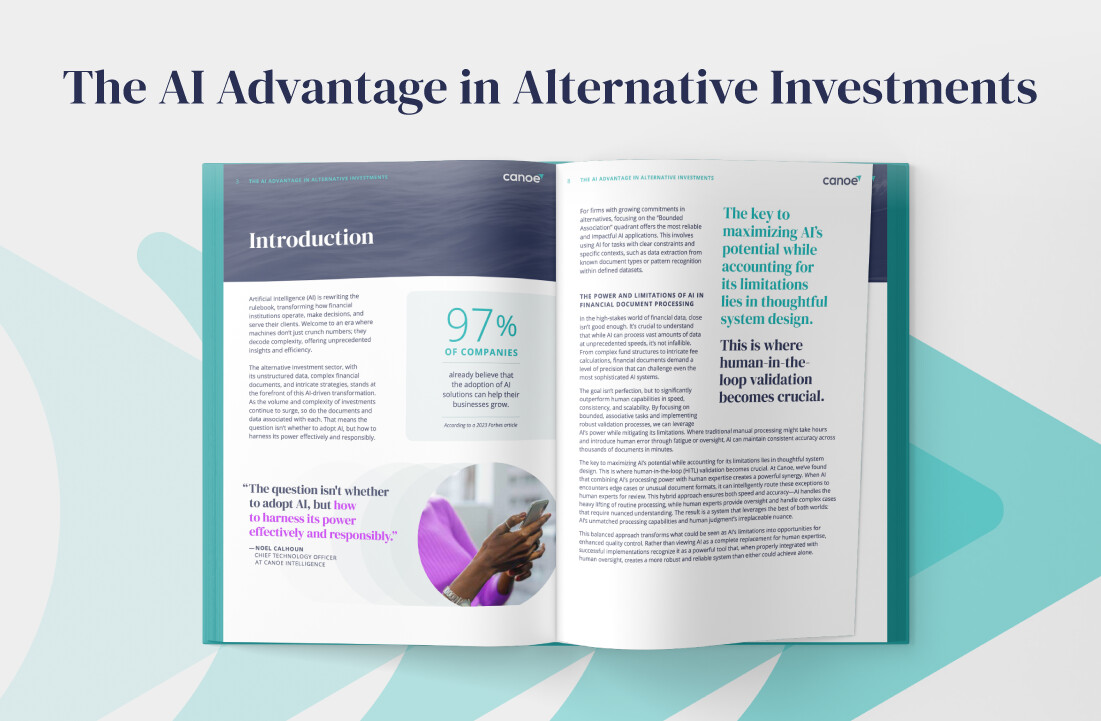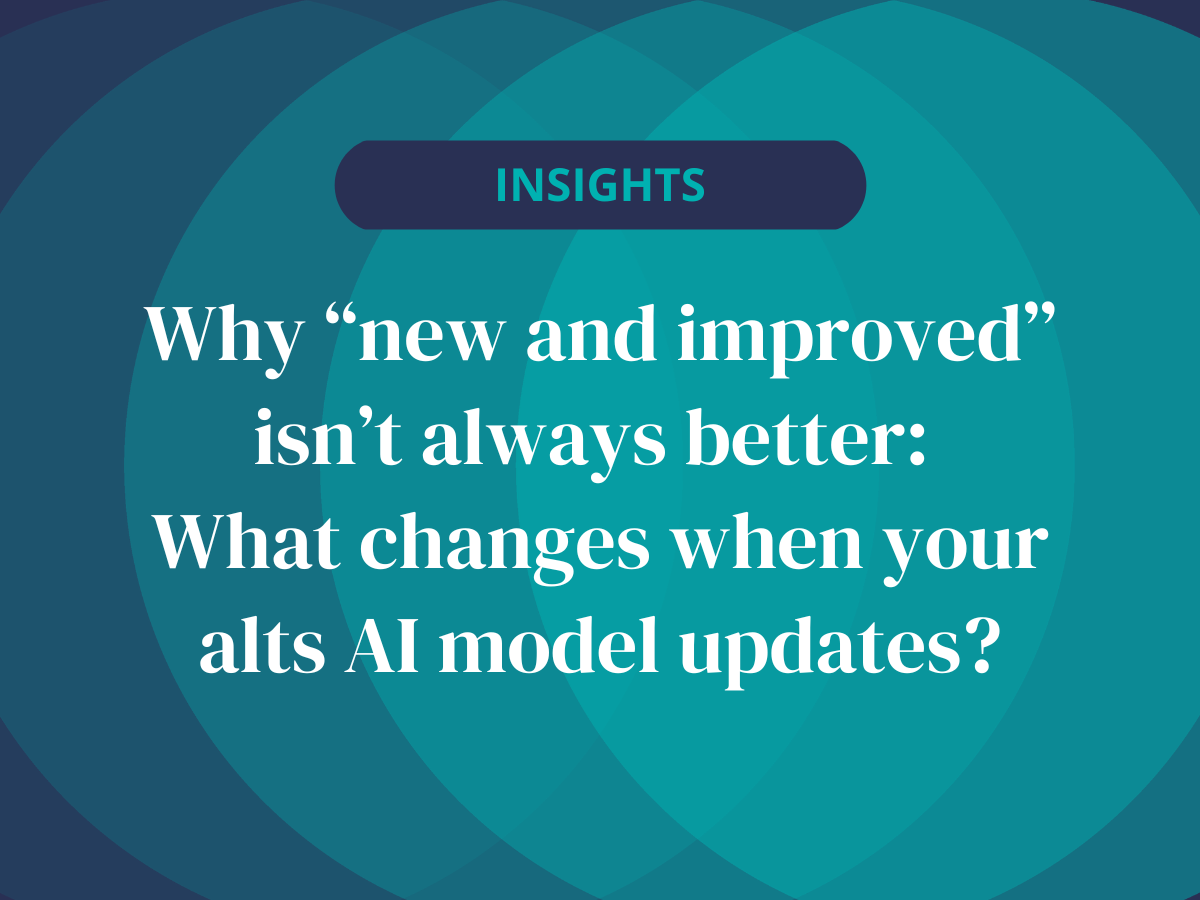Machine Learning for Alternative Investment Operations
When It Comes to Alternative Investment Operations, Machine Learning Is More Than Just A Buzzword
Ask any technology enthusiast what innovations give them the most excitement about the future, and AI and machine learning are likely to be near the top of the list. As engineers continue to pour resources into this area, the ability to use data and algorithms to help computers make sense of vast sets of information and draw logical conclusions that mirror those of a human has the potential to transform industries and make a real difference in the lives of people around the world.
While it’s easy to get starry-eyed about future use cases, machine learning is here today – and among institutional investors, there is significant debate around its utility. While some believe its predictive capabilities, automation and adaptability can streamline the investment process and improve performance, others believe that its susceptibility to errors and potentially long lead time to meaningful results make it more trouble than it’s worth.
At Canoe, we serve a diverse range of investors and allocators – OCIOs, funds of funds, insurance companies, endowments, pension funds, and more – and their views on machine learning in the investment process are just as diverse. But one area where this technology has an undeniably powerful effect is operations, particularly for document processing and data management in the alternative and private investment space. In this way, even skeptics of machine learning as a driver of returns can benefit from it as part of a holistic process.
As a greater number of firms move into these asset classes, identifying ways to navigate new and growing data burdens and enable employees to focus on higher-value tasks is an increasingly important priority. Let’s explore how machine learning can enhance operational efficiency, cost-effectiveness, accuracy, and security.
Document Processing and Data Management: An Ideal Use Case for Machine Learning
Investment into alternative and private markets has increased markedly in recent years, but as enticing as these asset classes can be from a portfolio construction standpoint, they require firms to manage a huge quantity of documents. These mostly consist of capital call notices, distribution notices, and account statements, as well as K-1s, factsheets, quarterly financials, performance estimates, manager letters, and more.
Each of these complex documents contains numerous data points that must be accounted for and acted upon, creating significant operational friction. Historically, this necessitated manual workflows around managing inbound data, tracking performance, reporting, and more, with staff spending large amounts of time performing page-by-page examinations and updating Excel spreadsheets.
While this is a longstanding challenge for alternative investors, it has become magnified due to the growing popularity of the asset class. These entities often work with numerous general partners (GPs), and even documents from the same GP can originate from different sources, including emails, company websites, and administrative portals. This fragmentation further hampers productivity while creating a greater potential for errors and security breaches. It all adds up to a status quo where alternative document management can quickly spiral out of control, from a nagging burden to a true operational nightmare.
Machine learning can make this process scalable by systematically analyzing all data that enters a given operational ecosystem. Making sense of this information can be difficult – the documents vary in terms of format, content, and the entities they relate to – but machines can do so in a matter of seconds, unlocking incredible accuracy and efficiency.
It’s important to note that not all machine-learning solutions are created equal. Too often, innovators in this space let the tail wag the dog – they have a powerful new capability and are eager to shoehorn it into any workflow that needs improvement, even ones that may not be an ideal use case. This has led to a healthy amount of machine learning skepticism among investors.
In contrast, document processing and data management for alternative and private investments is an ideal use case for several important areas of machine learning, including natural-language processing, text anchoring, table detection, spatial recognition, and computer vision. These capabilities enable computers to perform various vital functions in the document management process – making sense of information geared toward a human audience, extracting and normalizing vast datasets in sub-seconds, and recognizing patterns to reconcile similar types of documents and more.
By not just embracing machine learning, but leveraging it in a way that specifically addresses the operational challenges in the alternative and private investment space, firms can operate with maximum efficiency and peace of mind.
Canoe: Machine Learning in Concert
At Canoe, we are proud to provide operational workflow tools built to solve these very challenges related to document and data management. Using the latest advances in machine learning, our solution is just one part of a robust, unified workflow that helps investors take unprecedented control of their operational activities.
In addition to the aforementioned efficiencies that come with automating the document management process, Canoe offers several benefits that, while not necessarily falling under the umbrella of traditional machine learning, enhance the power of the overall solution. One of these is an ecosystem of shared intelligence, to which we have steadily added since our formation in 2013. When a firm becomes a client of Canoe, they aren’t tasked with training the machine, like traditional machine learning platforms. In other words, our system isn’t starting from scratch. Thanks to the diversity of our client base, the breadth and volume of their investments, and our constant work to refine our product, chances are good that we are already equipped to address every document that may require action, especially if multiple clients are invested in the same fund.
This goes beyond merely having systems built to examine and process a given document type – it also means greater security. For example, if our system detects a counterfeit capital call notice directing to a bad actor’s bank account, this information is stored indefinitely, so the rest of our client base is fully protected from the scam.
This is a powerful argument against investors building their own systems for data management. Even if you have the data science talent necessary for such a build, it will never have the strength in numbers that enables Canoe to function as swiftly and safely as we do. This ability to leverage the power of the collective while ensuring robust security and data protection is a unique feature that most technology platforms would be hard-pressed to replicate. And that’s putting aside the time and costs required to both get up and running and perform ongoing maintenance.
We also provide document-gathering capabilities through a range of automated retrieval methods, including RPAs, APIs, and Python. This is yet another way that we are leveraging technology to create repeatable processes and streamlined operations for alternative and private investors. This automation at the first mile, combined with AI-based data analysis, means the entire end-to-end workflow is automated, not simply the data extraction aspect.
None of this is possible without a robust commitment to our people and technology, and we pride ourselves on keeping these considerations at the forefront. We are always on the lookout for data science talent that can help us reach the next level. Our hire of Vishal Saxena, former Managing Director in Blackstone’s Technology and Innovations Group, as Chief Technology Officer is a recent example of this commitment. At Blackstone, Vishal built systems that required this level of automation, and now he is helping to bring those efficiencies to the industry at large.
This is the Canoe difference. In a world where machine learning can be little more than a buzzword, we take the next step and surround it with complementary processes, shared intelligence, and the right combination of technological might and human expertise. As movement into alternative and private investments continues to ramp up, access to this scalable ecosystem will become increasingly important to anyone managing a book of alternative and private investments, helping them work faster, save money, and reduce the risk of inaccuracy and fraud. Canoe can serve as a key partner amid this shifting landscape – and machine learning is a crucial piece of the puzzle.













